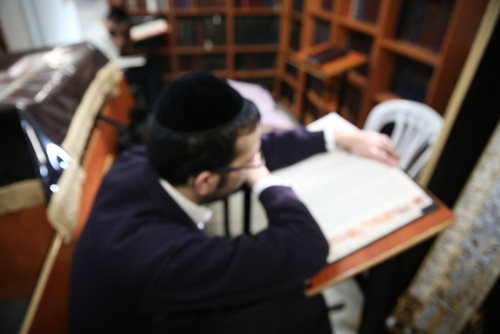In Mizmor Lisoda, a part of our daily morning prayers, we say a passage from Tehillim (psalms): “Ivdu es Hashem bisimcha, bo’u lifanav birnana – serve Hashem with joy, come before Him in song.” What is the difference between these two ways of wording our service before Hashem?
Is He Greater Than You?
The Gemara (Talmud) (Berachos 34b) tells us of an incident that happened when Rabbi Chanina ben Dosa went to study under Rabbi Yochanan ben Zakai. At that time, the son of Rabbi Yochanan became extremely ill. Being that Rabbi Chanina’s tefillos (prayers) were widely known to be answered, Rabbi Yochanan asked him to daven for his son. Rabbi Chanina placed his head between his knees, and davened until his tefillos were in fact answered. Upon seeing what had happened, Rabbi Yochanan commented, “Even if I had placed my head between my knees in prayer the entire day, my tefillos would not be answered.” His wife then turned to him and asked, “Is Chanina greater than you?!” Rabbi Yochanan replied, “No. But he is considered like a servant before the king, while I am comparable to a diplomat who comes in front of the king.” Rashi explains: A servant is a part of the King’s residence, coming and going as he pleases. Conversely, a diplomat is not at all commonly found before the King.
The Jew: Both an Ambassador and a Humble Servant
Perhaps we can explain, that every Jew can be comparable to these same two roles. On the one hand, at times, he acts with the humility of the servant who is constantly before Hashem, serving Him with Torah and tefillah (prayer) at every possible moment. Yet, at other times, he goes out to the world at large, while taking up the position of a diplomat who represents Hashem, only coming more infrequently before Him than does the servant. Thus, we say in the above passage, “Ivdu es Hashem b’simcha” – serve Hashem with joy, in the capacity of a humble servant who is always found before his King. But also, “bo’u lifanav birnana” – come before Him at different intervals in song, like the distinguished ambassador who continuously represents the King, but comes more infrequently into His direct presence.
Throughout the year, we fulfill the role of being His ambassadors, a kingdom of kohanim (priests) and a holy nation. We are busy in the world of accomplishment, whether it be through working at our jobs, taking care of our families, or any other of our routine activities. Although we come before Hashem three times a day in tefillah and set times for studying Torah, our ‘busy’ lives often take us away from the ideal situation of coming before the King more frequently.
Elul and The Humble Servant
However, during the days of Elul, and continuing into the Yamim Nora’im (high holidays), Klal Yisroel (the Jews) place a special emphasis on our other role. Indeed, the Chidushei Harim tells us, that our desire during the month of Elul is to be a people that are bound to Hashem out of our great love for Him. However, this can only happen if we first work on our humility, recognizing that we are nothing at all without Him. Thus, it is during this time of year that we stress our role as being the humble servants who are always found before our King. It is through this service of humility and submissiveness during Elul that we can build a much closer connection to Hashem.
Now Available: The Book, “To Return and Rekindle” – A small, pocket companion for the months of Elul and Tishrei. Written by, Rabbi Usher Smith, the author of the above article, and published by Feldheim.
The Sefer “Passion for Perfection” by this author is now available on Amazon https://a.co/d/ectlblM.


